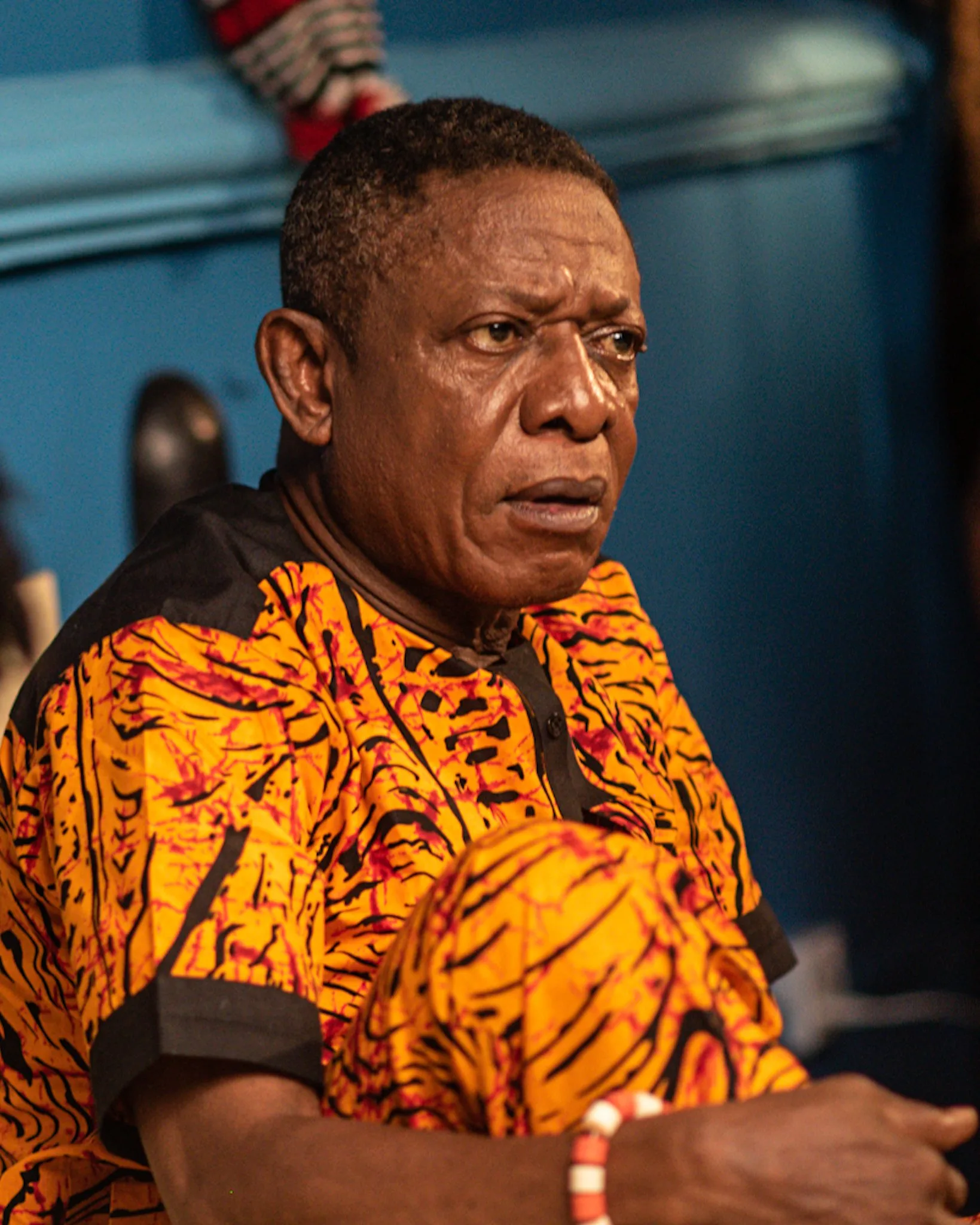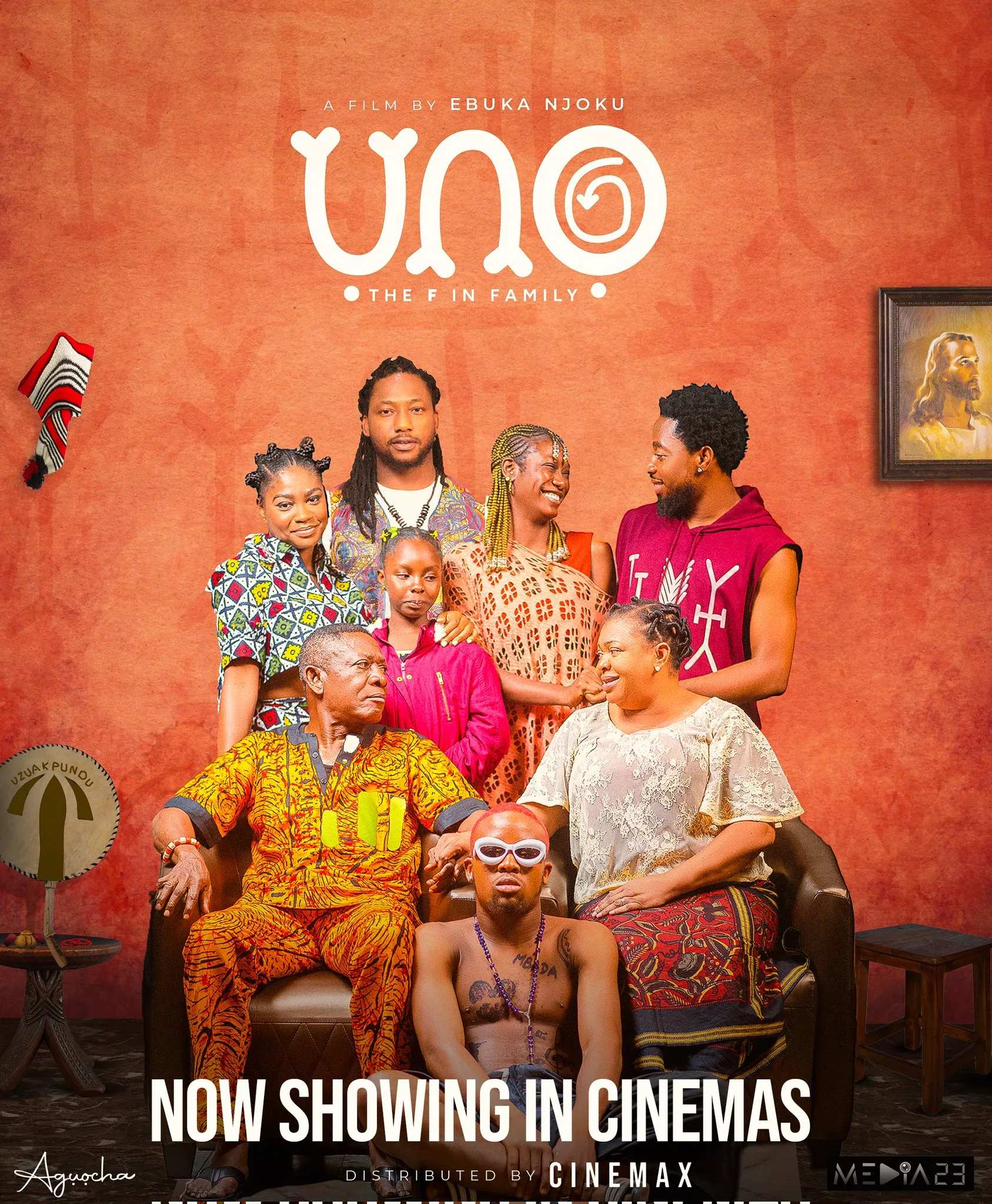In UNO, Njoku sets out to give us a snapshot of a family with all its heartaches, wranglings, and messiness served up with the occasional dash of humour.
By Victory Hayzard Solum
In 2022, Nollywood had something of an El Mariachi moment. Through bootstrapping, and with the support of his producer, Lorenzo Menakaya, Ebuka Njoku wrote and directed his feature debut, Yahoo+, an engaging, somewhat polemical, suspense thriller, which explored one of Nigeria’s most notorious vices, ritual killings. The popular consensus was that this low-budget offering of thrills was not worthy of one’s time. But Nigerian critics, including this reviewer, saw in the tightly controlled story bereft of excess fat — and with some ingenious cost-effective directing — the start of an amazing career in original storytelling. Njoku rode on the waves of this particular sentiment to critical acclaim.
It’s 2024, and here comes the filmmaker with his sophomore project, UNO (the F in Family), a staid comedy-drama about familial intrigue. The problems are back, and they’re bigger. And this time, they appear to be winning.
It’s been ten years since Junior (Keezyto) fled home in pursuit of his artistic ambitions. This time he returns on the urgings of his beloved fiancée, Rukayat (Tomi Ojo), who is intent on meeting his family. Except from their very arrival at the airport, Junior highlights a thousand and one opportunities for them to turn back. Why? His family is something of a mess. He’s got a father, Uzuakpundu (Nkem Owoh), who insists on being obeyed, despite being self-indulgent and ineffectual. His mother, Deaconess (Jennifer Eliogu), or Okomiss as she will be referred to, is the soul of the family, exuding warmth and grace while being somewhat heavy-handed in matters of faith. There are Ada (Sophie Chisom) and Gozie (DJ Capello) whose lives have taken a downturn since his disappearance; but Junior isn’t aware of the extent, is he? And, of course, there’s Nneoma (Chimamanda Ukwueze), a little bundle of joy, born in his absence, and bursting with curiosity.
Right off the bat, we’re let in on the reality of Junior’s fears. He is unwelcome here. Things have changed most substantively since his disappearance. But a mother’s love covers all, and Junior and Rukayat begin to ease right into this household where the unending chatter is a decoy, and there are secrets to uncover.
Owoh is in splendid form as Uzuakpundu. Over the years, there has been a steady refinement of the troublesome chatterbox that was emblematic of his earlier roles which is now shaded over by dignity and repose. Make no mistake, though. His mischievous antics are still very much on call, and you really shouldn’t miss his character’s introduction.

Eliogu might be the strongest actor on the roster. Her performance as our Okomiss here consists of soft tones and gentle pleading. But never too far off is that biting remark with which she whips her family into shape. Her embodiment of the motherly figure in control of a grumbling household is a class act and a masterpiece in subtlety.

Keezyto is back as Njoku’s muse. His performance in Yahoo+ drew instant praise and recognition, and a demand to have him grace our screens once again. His character here is much different from his first. Here he must embody tones of boyish fear and reluctance in the presence of uncompromising parents, balancing it with the strength of a man who has ventured out to the wide world in search of himself. And Keezyto succeeds for the most part. Here and there are those traces of vulnerability and humanity he infused in that first character of his which made him such a delight to watch.
Njoku is an interesting filmmaker. His turns of experimentation with cinematography ensures there’s always a freshness to his visuals. In Yahoo+, the aim was cost-effectiveness. In UNO, Njoku is out for a wider range of expression in pursuit of new ways of seeing things. The camera is one with the characters; a character in itself. He ensures you’re always enmeshed in the totality of the experience. His signature move lies in breaking the fourth wall with ingenuity. Here, a character tells us the story of his initial struggles away from home, holding us fixedly, almost documentary, as his story turns on his meet-cute with his beloved. A cut, and we see this narrative in the frame of a conversation amongst loved ones, in a way which never detracts from the seamlessness of the experience.
In UNO, Njoku sets out to give us a snapshot of a family with all its heartaches, wranglings, and messiness served up with the occasional dash of humour. There is love travelling along three tracks, as well as moments of genuine affection. But despite his best efforts, his intentions do not always translate themselves cinematically enough.

UNO has an unpleasant sound. Not the score. That part offers some serious high-life music delights with masterful performances from Keezyto himself. The audio, however, has some jarring dialogue replacement in some crucial scenes, with the effect being a disconnect from the action. In one particular scene, with the day bright and sunny and with no overcast, the dialogue track comes laid over with the sound of rainfall. One spends the better part of that scene, thus, looking for the source of the downpour instead of focusing on the engagement. The end scene has just as obvious an audio layering which floats atop the ongoing drama, contributing an extra helping of distraction. As this review is based on viewings of a screener copy, it is my utmost hope that these problems have been smoothened over in the final cut.
It also appears that, lost in his love affair with the camera, Njoku forgets to direct his cast, especially its less experienced constituents. There’s a lover boy here who reads his lines with secondhand conviction. He is meant to be the impassioned nonconformist who swoops down on a sedate love interest, snatching her out of her life of inertia. But for all the emotion mustered up, he might as well be the virginal schoolboy growing out of his phase with pickup lines, uneasy with the natural rhythms of seduction. There also is the dastardly composed and chaotic end scene where all pretence to visual appeal is totally forgotten. Perhaps all of this can be forgiven and ignored. But only if the story forges through strongly to the end.
There is some confusion about who some characters are, where they’ve been, or where they are coming from. On first meeting Kenzibe (Abayomi Alvin), one gets the sense of a friend left behind in Enugu but still in contact, eager to reconnect with his friend, and on quite familiar terms with Junior’s family, or the siblings, at least. That alone explains the casualness and lack of incident with which he jettisons his meeting with his friend in favour of an outing with the sister. But a move on from there, and what we get are two would-be lovers on first contact and first meeting. Here come all the first introductions and prodding questions which causes one to wonder about all that familiarity from the earlier scene.
Ada’s reaction on first meeting her brother demands justification. Njoku transposes the motions of a jilted lover onto the sister, with none of the requisite emotion and connection going along with it. The action flies in the face of all decorum and traditional accord, but where is the pain which birthed it? Nowhere in all of the following moments are we given a sense of just how close and in sync these two once were. Matter of fact, we are never given an image of just the sort of person Junior was prior to his leaving home. We only get the knowledge that it left a deep impact which, most traditional families considered, is to be expected. A few minutes after that first meeting, we have Ada in her brother’s bedroom, chummy and all smiles, but nowhere to be found is that depth of emotion which accounts for their earlier encounter.
A similar move plays out at the dining scene, which, however, raises a slightly different concern. Barely three hours after Junior’s arrival, Okomiss slaps him for his blasphemy. This is the picture of an everyday Nigerian family with slight differences between them; something the Uzuakpundus are not on this day. Where are all the wariness and studious observations that attend reunions after significant time apart? Njoku appears not to grasp the amount of estrangement which crops up from distances of two or three years apart, let alone, one over a decade long. There is a familiarity present here which takes a moment to build. But, perhaps, in the bid to keep the action within twenty-four hours (yet another signature), Njoku forgoes all of the required work for one thing only; shock.
The most interesting thing, however, is how bereft of shock and drama the story turns out in the latter moments where this is most needed. Or perhaps, that is not quite apt. They are, in fact, shocking for all the wrong reasons.
In one pivotal scene, Okomiss lets loose some family secrets in a manner which is totally uncharacteristic of the sort of personality we have seen her exhibit in the prior scenes. In the matter at hand, she has already shown such savvy and circumspection that the sudden turnaround needs some explaining. What precisely has been said in this moment that’s so unheard of that it stings her out of her characteristic good sense? But that’s not the last of it. If UNO has a problematic manner of revealing things, its resolutions are even shoddier and less impactful.
Is the story Uzuakpundu tells his wife towards the end enough to cause a true change of heart in someone adamant about leaving? If some flippancy is evident here, Junior’s equal turn-around a few minutes later is even more whimsically done.
It’s obvious that at this point in the final act, the writing is on automated cruise control. Njoku has given up all pursuit of rhythm, rigour, and originality, settling instead for the timestamp demands of traditional plot guidelines.
Now a sidebar on rigour: Njoku appears interested in keen portrayals of societal anxieties, especially as regards the vices most common with our generation. This is his second time utilising the plot of a loved one venturing into the world’s oldest profession. It might be pertinent to point out that most times, in reality, the people in question do go on to carry out precisely what they set out to do. There are very few last-minute saves or twists of fate. What happens then?
I have it on his good authority that the 1990 Garry Marshall rom-com, Pretty Woman, served some slight inspiration for this film. To use that flick as a case in point, in the hands of lesser filmmakers, the character Edward would have forestalled having sex with Vivan in pursuit of some higher sense of nobility, and she would have had quite the sob story about how she became a hooker, possibly on account of some serious trauma, or most probably, this is her first time. Pretty Woman dispenses of all that: here is a hooker, here is a man of means, and they have sex on their first night together. What’s at stake is not her chastity, but her inherent value as a human being worthy of romance despite her lack of innocence. Imagine wresting such a premise from its lighthearted comedy confines towards more dramatic treatments. Perhaps, that’s an idea too fantastic for a society such as ours. Perhaps, not. But perhaps one should also not jump into shallow ponds if one is scared of getting muddied up. Nollywood is chock full of stories with pretend topicality and easy saves that challenge no one, where the tension is only apparent; a detraction from true drama.
All these said, there are amazing brushstrokes in the writing of the characters, such as in Gozie’s glasses that never leave his face, like a character straight out of an old animated sitcom. There is even more ingeniousness in how certain questions are left open, as opposed to opting for false conciliations. The disconnect between the generations is captured adequately, giving free room to bullheaded displays of prejudice in both camps. And one just might go on a Tomi Ojo binge on the basis of her performance here while waiting for Ukwueze’s next screen venture.

Njoku has the potential to lead the next generation of filmmakers bringing truth, originality, and budget-friendly ingenuity to mainstream Nollywood where often the recourse is to glamour and empty clangour. But that can only be a privilege attained by painstaking rigour, as opposed to half measures and old-time contrivances. The game is afoot, the score is one for two, and we can’t wait for where the next shot takes us.
Rating: 2.5/5
(UNO: the F in Family is currently showing in cinemas)
Victory Hayzard Solum is a freelance writer with an irrepressible passion for the cinematic arts. Here he explores the sights, sounds, and magic of the shadow-making medium and their enrichment of the human experience. A longstanding ghostwriter, he may have authored the last bestselling novel you read.




